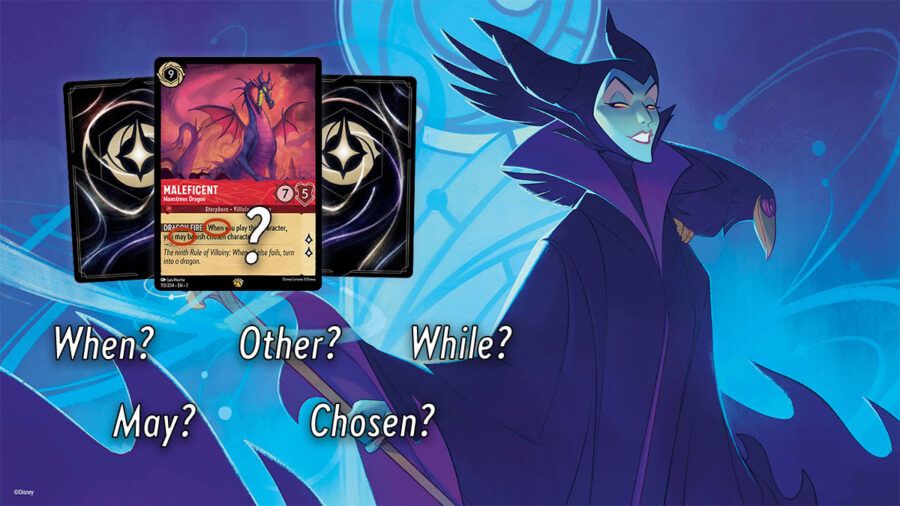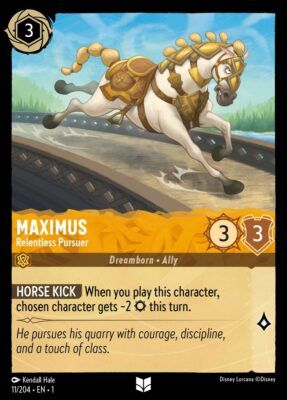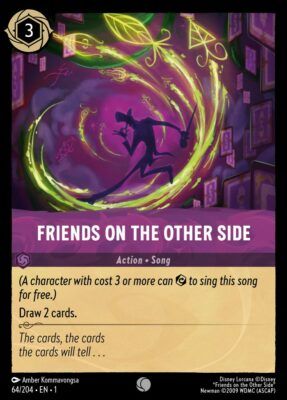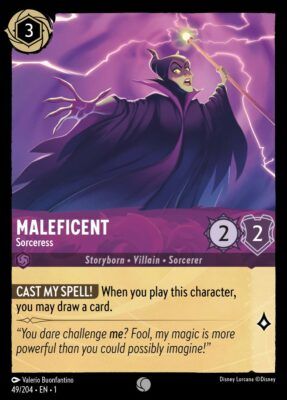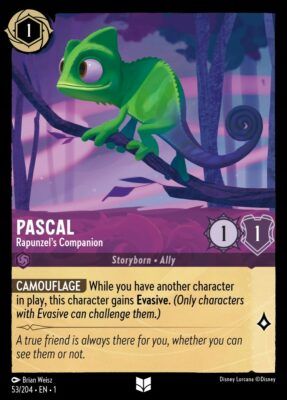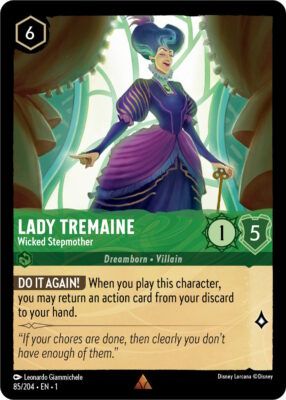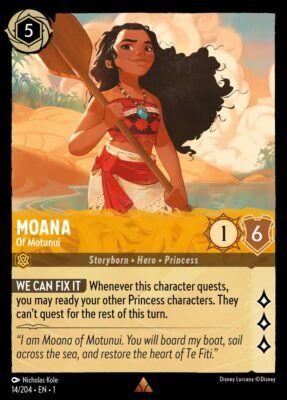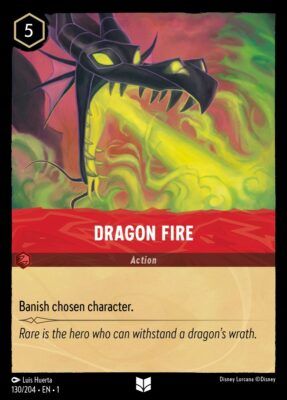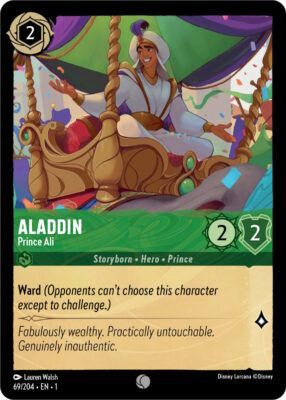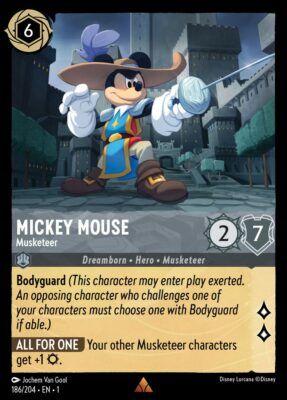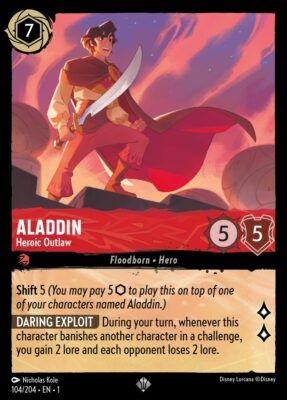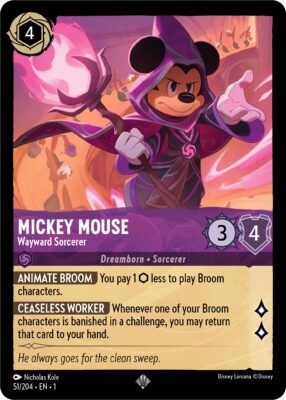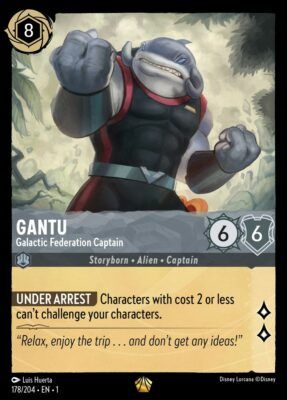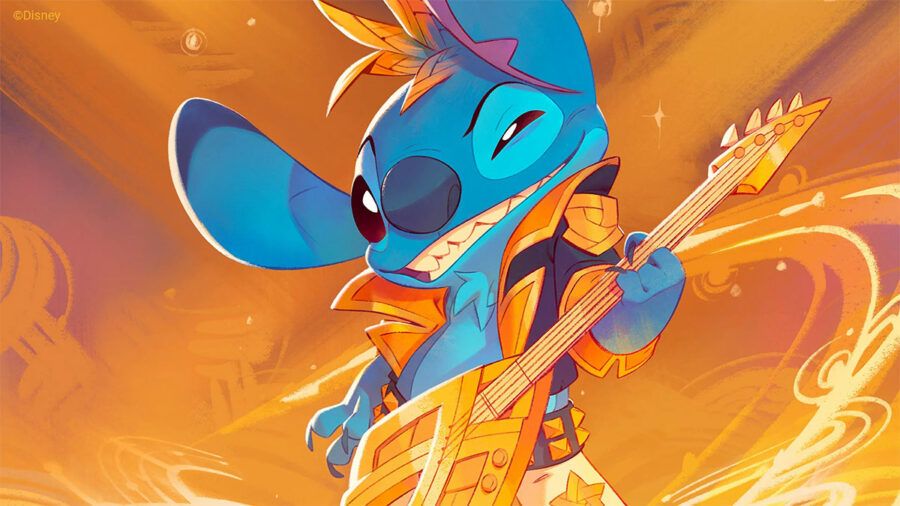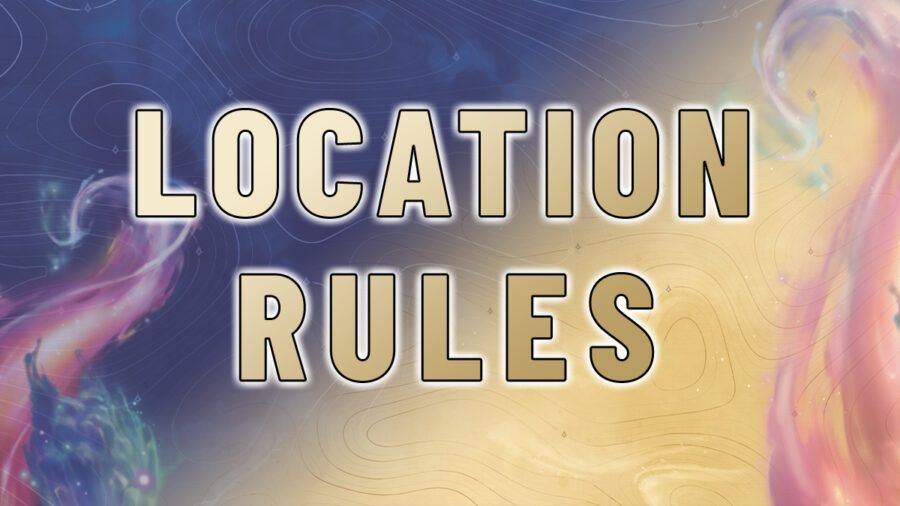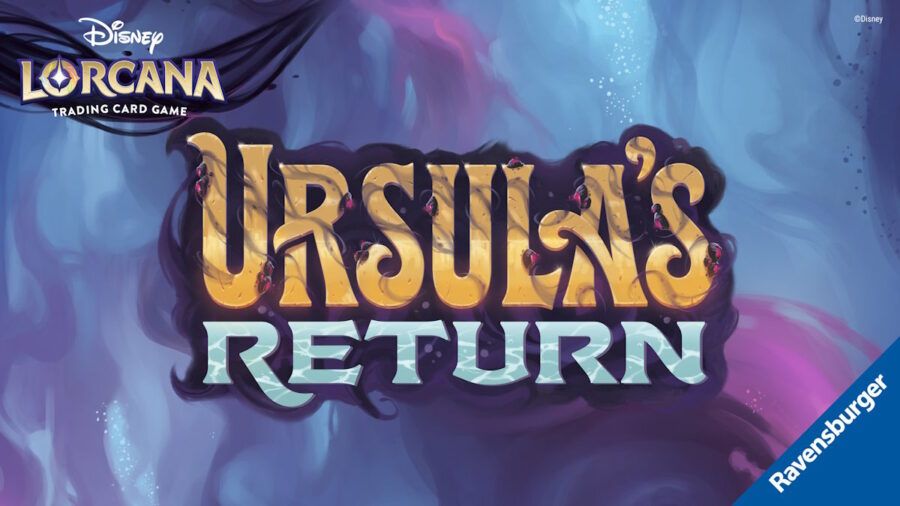The way that Lorcana card rules are written is very specific. Each card has a rule that needs to work exactly as written, without being interpreted wrong. Even with the best of intentions, that’s a hard job for designers to get right every time!
The words used in the rules text are chosen carefully. We’ve highlighted some of those choices to show how they work. It might seem simple, but you’ll find quite quickly in a match that rules can be taken very differently between two players.
Can / May
“Can” and “may” mean you can choose to do this thing or not. This is a really important distinction because sometimes you’ll want to play a card or use part of its ability, but not a specific part of the ability.
If that action or ability doesn’t say “May” or “can”, then technically that part of that ability must happen. We haven’t got clarification but it seems like there are some cards with abilities that must happen, even if you wouldn’t want them to.
Example 1
Maximus Relentless Pursuer has an on-play ability that makes a character lose 2 strength for this turn. It doesn’t say may or can, and doesn’t specify opposing character.
If your opponent doesn’t have a character and you do, technically this means you must reduce the strength of one of your own characters. It could also mean you have to reduce Maximus’ strength if he is the only character in play. We are waiting to confirm this.
Example 2
It’s your turn, you draw one last card and because you’ve drawn so many cards you have none left in your deck. According to the rules, if you go to draw a card and you have none left – you lose the game. You’re not out yet!
You have two cards left in your hand – Friends On The Other Side and Maleficent Sorceress.
If you play one of these two cards, you will lose the game because you must draw a card – and have no cards left to draw. Which one is it?
Well, Maleficent says you “may” draw a card when it’s played, meaning you can play her without having to draw. If you play Friends or have a character sing the song, the card text is just “Draw 2 cards” – meaning you have to draw two cards, and will lose the game.
When You Play, While, Whenever
“When you play” means when that card touches the table and comes into play. “While” means only while the specified thing after that text is true. So while means all of the time that thing is happening.
Pascal is great while you have at least one other character on your board, but without a friend, he’s in trouble! With Lady Tremaine, you could use an action card, then play her to return that action card to your hand and play it again if you have the ink.
Her effect happens when she is played. So if she is played multiple times, it will happen every time.
“Whenever” means whenever – or each time – the written thing happens. So it can be triggered multiple times unless otherwise noted. Moana Of Motunui is a great example, where whenever she quests, she can ready (un-exert) other Princess characters – though they can’t quest again this turn.
Because the card states “whenever” it means she can do the same thing next turn. If another card makes her ready again, she can do the same thing again in this turn if she quests again! So you could make all of your Princess characters challenge, then ready then with Moana so they can’t be challenged.
Because they are readied, you could then use any activated abilities they have, or make them challenge. Then if you have a different card that readies Moana, she could then challenge again, readying all of the other princess characters again!
Chosen / Choose
“Chosen” is a very specific bit of text. Sometimes a card’s effect will choose a character for an effect. If a card just says chosen character, or chosen card, you can choose whatever character or card you want.
If the card says chosen opposing character or card, you can’t choose your own character/card. If the card only says chosen or choose for a character/item etc., it can be used to choose either you or an opponent’s card.
However, watch out for characters with the Ward keyword. They can’t be chosen, except for challenges.
That does mean that effects that don’t say choose or chosen can get around Ward. So effects that target all characters or all of a type of card should still work – unless they have “choose” in the text.
Because Dragon Fire says “Banish chosen character” and Aladdin Prince Ali can’t be chosen except to challenge, Dragon Fire can’t be used on him.
One extra note is that “chosen” or “choose” only applies to cards in play, not in the discard – unless it specifies. Some cards allow you to return a chosen character to your hand, some allow you to return a chosen character from the discard to your hand.
All / Every / Other / Each
Some cards will target all characters or all of one type of card, and won’t have to choose characters for their effects. This gets around things like Ward that can’t be chosen.
If a card says “banish all characters” for instance, it would banish every character on the board – even yours, and even characters with Ward.
If a card targets or works for every character or card of a certain type, it means the effect includes that card. If the card says for every other or other – it means it doesn’t work on this card.
Mickey Mouse Musketeer has an effect that says “Your other Musketeer characters get +1 “. That means he doesn’t get the +1 as it’s only other Musketeer characters.
An interesting card that will work well in multiplayer games is Aladdin Heroic Outlaw. His effect states “During your turn, whenever this character banishes another character in a challenge, you gain 2 lore and each opponent loses 2 lore.“
So this has a few conditions. Aladdin has to challenge and banish a different character, and it has to be on your turn. When this happens, you gain 2 lore but each opponent loses 2. In a multiplayer game of 4 people, your three opponents would all lose 2 lore!
A Note On Card Values
If a card’s effect says it targets cards of a certain Ink cost, Strength, Toughness, or Lore – it targets the number printed on the card, not its current cost. This is what we believe so far…
So, let’s imagine that you used Mickey Mouse Wayward Sorcerer to play a hypothetical Broom that cost 3 , but paid 1
less for it due to Mickey’s ability. That Broom still costs 3
, you just paid less.
If your opponent has a Gantu Galactic Federation Captain exerted, on the next turn, that Broom could challenge him. Gantu’s effect only stops characters with a cost of 2 or less – it doesn’t matter what ink cost was paid for the character.
There are still many cards to be released, so we’ll have to see how this will work for other cards. For instance, you might have a card that says “Banish a chosen character with strength 2 or less”. If that character is normally 2 , but has a +2 strength for this turn from another effect – would it be banished?
This is something we’ll likely see come up quite soon and will clarify as soon as possible.
If you want to learn more about the rules for abilities on cards, read our last article Lorcana Card Rules – Abilities + Keywords Explained.

